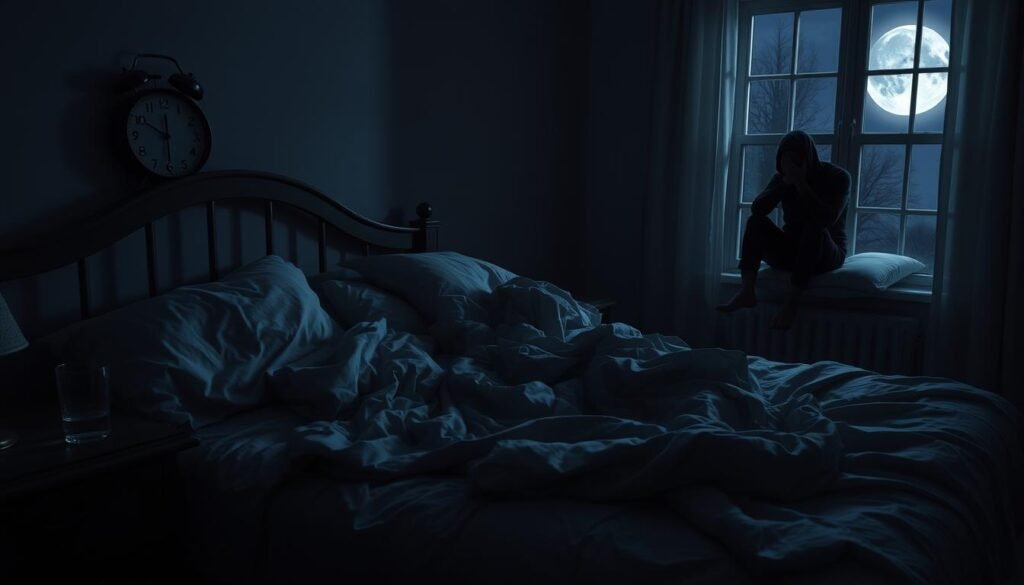Over 35% of adults in the U.S. suffer from insomnia symptoms. Nearly 20% face short-term insomnia that doesn’t last over three months. With over 60 million Americans battling poor sleep, it’s vital to grasp how hormones affect our sleep. Hormonal insomnia impacts many, especially during big life changes like pregnancy and menopause. These changes in hormone levels can mess up our sleep-wake cycles, causing restless nights.
We’re diving into the world of hormonal insomnia, its signs, and the hormones that mess with sleep. By figuring out these patterns, you can find natural ways to sleep better like these sleep remedies. Understanding and managing hormonal insomnia means a better daily life and exploring how to fix it.
Key Takeaways
- Hormonal insomnia affects lots of adults.
- Hormone changes can ruin sleep patterns.
- A healthy lifestyle helps improve sleep quality.
- Natural solutions, like warm milk or chamomile tea, can help you sleep better.
- Talk to a doctor to handle symptoms right.
- Knowing about your hormones is crucial for better sleep-wake cycles.
Understanding Hormonal Insomnia
Hormonal insomnia is a type of sleep disorder caused by changes in hormone levels. It mainly affects sleep quality and hits women hard during menopause or pregnancy. Changes in hormones, like cortisol and estrogen, mess up our circadian rhythm.
This leads to troubles like not being able to fall asleep, waking up a lot, or can’t get back to sleep. It’s tough dealing with these sleep issues.
It’s important to spot the signs of hormonal insomnia early. You might notice sleep problems that happen with your menstrual cycle or during menopause. This can come with more stress or feeling really anxious. These problems could make other health issues worse. You might even see more acne showing up.
Talking to a doctor about doing some hormone tests could help you understand what’s going on. They might suggest hormone therapy or making changes in your lifestyle. These can help you sleep better.
Keeping a regular sleep schedule helps a lot with deep sleep. Trying to handle stress better, eating healthy, and exercising can make a big difference. These steps can lessen the sleep problems from hormone changes. It’s a way to start feeling better overall.
Common Symptoms of Sleep Disturbances
It’s key to know the common symptoms of sleep issues to spot insomnia. Many people have trouble falling asleep, wake up often at night, and have no regular sleep schedule. These problems can make you tired, easily annoyed, and unfocused during the day.
Insomnia can really upset your day-to-day life. It can make you feel emotionally unstable and lower your brain function. Studies show that women struggle with this more than men. Sleep problems linked to menstrual cycles often get worse before a woman’s period. About 70% of women with premenstrual dysphoric disorder (PMDD) have a hard time sleeping then.
Click here for more details on what causes sleep issues. Almost a third of women say insomnia messes with their daily tasks. It’s not just an annoyance; it can lead to more serious health issues. This includes a higher risk of depression and becoming overweight.

| Symptom | Description | Impact on Daily Life |
|---|---|---|
| Difficulties falling asleep | Struggling to initiate sleep despite feeling tired. | Results in fatigue during daytime activities. |
| Frequent awakenings | Waking multiple times during the night, making it hard to return to sleep. | Leads to irritability and decreased focus. |
| Irregular sleep schedule | Inconsistent sleep patterns affecting overall sleep quality. | Contributes to emotional distress and anxiety. |
To manage these symptoms, try to keep a steady sleep schedule and relax before bed. Linking hormonal changes to sleep problems is key to finding good solutions.
How Hormones Affect Sleep Quality
Hormones have a big impact on how well we sleep. They control how fast we fall asleep and the quality of our sleep. The two main hormones involved are melatonin and cortisol. Melatonin tells our body it’s time to sleep. It usually goes up at night, making us sleepy.
Cortisol, the stress hormone, affects how well we sleep, especially when it’s high. This can happen because of stress or worry.
As we go through different stages in life, our sleep can be impacted by hormones. Women, for example, may notice changes in sleep around their periods due to shifting estrogen and progesterone levels. Menopause brings its own challenges like hot flashes and night sweats, disturbing sleep.
A healthy lifestyle is key to balancing hormones and enhancing sleep. Creating a bedtime routine and avoiding stimulants like caffeine improve sleep quality. Additionally, relaxing before bedtime through meditation or yoga can lower cortisol levels, helping us sleep better.
Knowing about hormonal effects can lead to better sleep practices. Making changes in our sleep environment and habits can improve rest. Recognizing the link between hormones and sleep is vital, especially for women facing sleep challenges during hormonal shifts.
Key Hormones Involved in Sleep Regulation
Sleep regulation is tightly linked to several key hormones. These hormones are essential for a healthy sleep cycle. Melatonin, known as the “sleep hormone,” plays a crucial role. It increases at night, telling our body it’s time to sleep.
Estrogen and progesterone also affect how well we sleep. They are especially important during hormonal changes like menstrual cycles, pregnancy, and menopause. These hormones help in managing body temperature and relaxation, key for a good night’s rest.
Testosterone is vital too, especially for men. It peaks during REM sleep, which is crucial for restoring our body. This stage also supports reproductive and bone health.
Cortisol is linked with stress and can harm sleep quality if it’s too high. If cortisol levels rise too much, it can stop melatonin from working right. This makes it hard to fall and stay asleep. Using electronic devices late at night can make this problem worse. They affect cortisol levels.
Understanding the interplay between melatonin, estrogen, progesterone, testosterone, and cortisol helps. It shows the complex link between our hormones and how well we sleep.

Causes of Hormonal Insomnia
Two big reasons for hormonal insomnia are menopause and thyroid disorders. Each one affects sleep in its own way, leading to insomnia.
Menopause and its Impact on Sleep
Menopause is a big change in a woman’s life because of hormone shifts. These changes make it hard for women to sleep well. For example, hot flashes and night sweats wake them up often.
This means they feel more tired and irritable during the day. Also, changes in mood and anxiety can make it tough to fall asleep.
- Reduced estrogen levels can cause mood swings and increase anxiety, making it difficult to fall asleep.
- Low progesterone levels during menopause may result in insomnia, as this hormone typically aids in sleep regulation.
- Women transitioning through menopause report a significant rise in sleep disturbances, impacting both mental and physical well-being.
Thyroid Disorders and Hormonal Sleep Imbalances
Thyroid disorders mess with sleep by changing hormone levels. Hypothyroidism and hyperthyroidism can both make sleeping hard in different ways.
| Thyroid Condition | Effects on Sleep |
|---|---|
| Hypothyroidism | Can lead to fatigue and depression, making it difficult to maintain regular sleep cycles. |
| Hyperthyroidism | May cause increased anxiety and restlessness, resulting in difficulties falling and staying asleep. |
Hormone imbalances from thyroid issues can worsen sleep problems. It’s important to get ahead of thyroid health issues. A doctor, like those at Raleigh OB/GYN, can help manage these sleep challenges.

Strategies to Improve Sleep Naturally
Improving sleep quality takes many steps, including living healthy, staying on schedule, and using natural supplements. These methods help a lot with hormonal insomnia.
Adopting a Healthy Lifestyle for Better Sleep
To sleep better, leading a healthy lifestyle is key. Adding regular exercise helps a ton. It makes your sleep-wake cycle more regular.
Eating right is also important. Try not to have caffeine late in the day. It can cut your sleep by 45 minutes. Choose snacks wisely to not upset your sleep.
The Importance of a Consistent Sleep Schedule
Having a regular sleep schedule helps your circadian rhythm. Stick to the same sleep routine and wake time every day. This will improve your sleep quality.
With a set routine, your body adapts better. This makes falling asleep and waking up easier.
Natural Supplements to Support Sleep
Natural supplements can aid those with hormonal insomnia. Melatonin supplements, taken 30-60 minutes before bedtime, help a lot. Herbal remedies like chamomile and valerian root also relax you and get you ready for sleep.
Talk to a doctor before starting any supplement. This ensures they are safe and the right dose for you.
Behavioral Techniques for Managing Hormonal Insomnia
Managing hormonal insomnia can be done through effective behavioral techniques. These techniques can greatly improve sleep. Cognitive behavioral therapy (CBT) for insomnia is especially useful. It addresses the thoughts and behaviors that make sleep difficult.
Research shows CBT can greatly help menopausal women struggling with sleep.
Proper stress relief is crucial for better sleep. High cortisol levels can mess up sleep patterns. It can make you restless and irritable. Methods like mindfulness and deep breathing can lower stress.
Techniques like yoga also help. They make you feel calm and manage your sleep better.
Healthy bedtime habits are key. They should be consistent and relaxing. A calming routine at night tells your body it’s time to relax. Things like reading, warm baths, or gentle stretches can help you fall asleep.
If sleep issues remain, it might be good to talk to a professional. Good sleep is vital for your health and happiness.
The following table shows various techniques to manage hormonal insomnia and their benefits:
| Technique | Benefit |
|---|---|
| Cognitive Behavioral Therapy | Tackles thoughts and behaviors that ruin sleep |
| Mindfulness Meditation | Makes you relax and eases anxiety |
| Yoga | Makes you more relaxed and improves sleep |
| Deep Breathing Exercises | Reduces stress and brings calmness |
| Consistent Sleep Schedule | Keeps the body’s clock in check |
| Establishing a Bedtime Routine | Gets your body and mind ready for sleep |
For more on natural remedies and sleep tips, look into more resources about natural sleep aids and home remedies. Choosing the right behavioral strategies can lead to better sleep and health.
When to Seek Professional Help
If you can’t sleep well for a long time, you may need expert advice. Trying to fix sleep habits and lifestyle but still tossing and turning at night means it’s time to see a doctor. Often, sleep troubles are due to hormone issues that need a doctor’s care.
There are many ways to help you sleep better. Doctors might give you medications like benzodiazepines, including estazolam and others, for sleeping problems. Another option is Z-drugs like eszopiclone, which also help you fall asleep. For some, doctors suggest DORAs that stop certain brain chemicals that keep you awake.
For issues like restless leg syndrome, antiseizure meds like gabapentin might help. There are also non-prescribed options such as antidepressants that make you sleepy.
Melatonin supplements are also popular for sleep problems. This hormone helps control when you sleep and wake up. You can get it with or without a prescription. But, talk to your doctor first, especially if you’re taking other meds, to avoid bad reactions.
To wrap up, getting professional help is crucial if you can’t solve sleep issues on your own. Your mental health affects how well you sleep, so treatments need to be personalized. The right help can improve your sleep and health overall.
Conclusion
Understanding and managing hormonal insomnia is key for good sleep. Almost one-third of people have trouble sleeping. This issue is even more common in older adults.
Women are especially likely to have insomnia. It’s important to find natural treatments that work with their hormone changes.
Learning how hormones affect sleep helps. Keeping a regular sleep schedule is a good start. Good sleep habits and behavioral techniques also help. These steps can improve sleep.
For women in menopause, Hormone Replacement Therapy might help. It can ease significant sleep problems.
Better sleep is possible. With the right knowledge and help, you can beat hormonal insomnia. This leads to better health and more refreshing sleep.